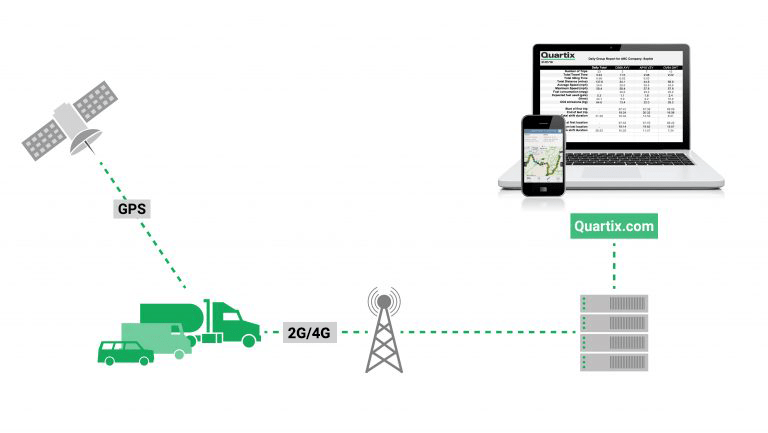See for yourself how Quartix works with our fully interactive real-time demo.

Have you ever wondered how a vehicle GPS tracker works? These innovative devices have revolutionised fleet management, personal vehicle tracking, and even outdoor adventures. Understanding the technology behind GPS trackers can help you appreciate their benefits, whether you’re a fleet manager, a business owner, or just someone curious about how they function. Let’s break down the key components and workings of a vehicle GPS tracker in an accessible and engaging way.
What is a Vehicle GPS Tracker?
A vehicle GPS tracker is a device that uses the Global Positioning System (GPS) to determine the location of a vehicle in real-time. This information can be incredibly valuable for a range of applications, from monitoring fleet vehicles to ensuring the safety of personal cars.
How Does a Vehicle GPS Tracker Work?

- GPS Satellites: At the heart of every GPS tracker are satellites. There are a network of at least 24 satellites orbiting the Earth, continuously sending signals. Your GPS tracker receives these signals to pinpoint its location.
- Signal Processing: The tracker uses a process called trilateration. By calculating the distance to at least three satellites, it can determine the precise location of the vehicle. This is similar to how your smartphone finds your location using GPS.
- Data Transmission: Once the tracker knows its location, it sends this data to a server. This transmission can occur through various methods, including:
- Cellular Networks: Most commercial GPS trackers use cellular networks to send data to cloud-based servers.
- Satellite Communication: Some trackers utilize satellite communication for remote areas where cellular signals might be weak.
- Wi-Fi: Certain devices can also send data over Wi-Fi networks, particularly in urban areas.
- Data Storage and Analysis: The server receives the location data and stores it for further analysis. Fleet managers can access this information through user-friendly dashboards, allowing them to monitor vehicle locations, routes, and performance metrics in real-time.
- User Interface: Finally, most GPS tracking systems offer a web or mobile application where users can view real-time location data, historical routes, and alerts. This interface typically includes features like geofencing, which alerts you when a vehicle enters or exits a specified area.
Benefits of Using a Vehicle GPS Tracker
- Real-Time Monitoring: Track your vehicles’ locations in real-time, making it easier to manage logistics and respond to emergencies.
- Improved Efficiency: Analyze routes and driving behavior to optimize fuel consumption and reduce travel times.
- Enhanced Safety: GPS trackers can provide alerts for speeding, harsh braking, or unauthorized use, helping to keep drivers safe.
- Recovery of Stolen Vehicles: In the unfortunate event of theft, a GPS tracker can help law enforcement locate and recover your vehicle quickly.
Want to Know More?
If you’re interested in diving deeper into specific terms or concepts related to GPS tracking, be sure to check out our glossary page for definitions and explanations!
Conclusion
Understanding how a vehicle GPS tracker works can open your eyes to the many benefits it offers. From real-time monitoring to improved operational efficiency, GPS technology is essential in today’s world. Whether for business or personal use, investing in a reliable GPS tracking solution can provide peace of mind and enhance safety on the road.
Ready to take control of your vehicle tracking? Explore the options available and see how a GPS tracker can make a difference for you!

